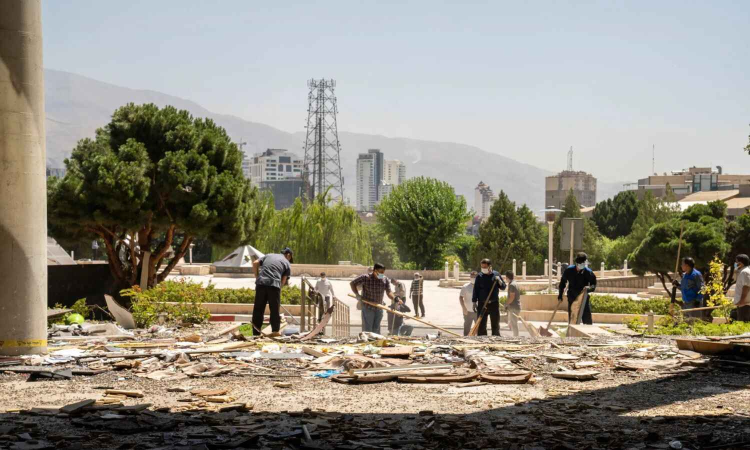Muddled east: Get ready for some post-war politics
Among Palestinians in Gaza, the question will be asked of their defeated Hamas leaders: “What in the world were you thinking on Oct. 7, 2023?

I truly hope this Iran-Israel ceasefire holds and gets extended to the Gaza Strip, first and foremost to see an end to all the killing. But second, because I think this war will trigger in its aftermath much-needed debates in Iran, Israel and the Palestinian community.
These debates won’t happen the morning the guns fall silent, when leaders from every country involved will try to claim some victory. But everything in my gut tells me these debates will happen the morning after the morning after, when all the internal politics will start to kick in.
Among Palestinians in Gaza, the question will be asked of their defeated Hamas leaders: “What in the world were you thinking on Oct. 7, 2023? You started a war with Israel, a vastly superior military foe, with no end game other than destruction, which only got the Jews to retaliate with no end game other than destruction. You sacrificed tens of thousands of homes and lives to win the sympathies of the next generation of global youth on TikTok, but now there is no Gaza.”
Among Israelis, the question that will be asked of Israel’s radical religious-nationalist government by the largely secular elements of that society — air force pilots, cyberwarriors, technologists, scientists, weapons designers and Mossad agents, the people who defeated Hamas, Hezbollah and Iran — is this: “Where do you think you’re taking us? We were the ones who won this war and we will not let you leverage this victory to win the next election and carry out your plan to crush our Supreme Court, annex the West Bank, excuse the ultra-Orthodox from serving in the army and create a pariah Israel that our kids will no longer want to live in. No way.”
And among Iranians, the question that surely will be asked of their clerical leaders and corrupt Revolutionary Guard: “You spent billions of dollars trying to build a nuclear bomb to threaten Israel and remote-control Lebanon, Syria, Iraq and Yemen. But you brought the war home to our country — our families had to flee Tehran, and our generals were killed by Israeli drones in their beds. All you did was destroy a few buildings and kill some civilians in Israel, and when Donald Trump attacked our three key nuclear facilities, your response was to put on a harmless sound and light show over a U.S. air base in Qatar. You were paper tigers who only knew how to use technology to repress our people. Meanwhile, our great Persian civilisation is destitute, broken and miles behind the rest of the world.”
It may not happen overnight, but every bone in my body says these discussions are coming. Because we have never had a war like this in the region. That is, a war in which Hamas, Hezbollah, Iran and Israel are all led by religious nationalists who think God is on their side. A war in which Israel has made Gaza uninhabitable, after being humiliated by Hamas forces that killed more Jews in one day than in any day since the Holocaust. A war in which Israel was able to decapitate and largely destroy Hezbollah as a political force in Lebanon and Syria, where the pro-Iranian militia had helped crush the shoots of democracy since the 1980s. A war that saw Iran’s key nuclear facilities bombed by a US president, something the Iranian mullahs never thought would happen.
In short, everyone went all the way, bursting through psychological and military barriers we never imagined would be breached. If they don’t stop now, or soon, they will all get where they are going: into a forever war — everyone, everywhere, all the time — that will leave nothing and no one unscathed.
For all of these reasons, I’m convinced that some very big internal debates are coming — if the wars stop.
For autocratic movements like Hamas or countries like Iran, history teaches us that internally driven regime change happens only after the war is over, and without foreign interventions, said pollster and political scientist Craig Charney. It has to happen organically by a change in the relationship between the leaders there and those they are leading.
“In Serbia in 2000, nationalist President Slobodan Milosevic fell after losing wars in Bosnia and Kosovo when he tried to steal the next election,” Charney said in an interview. “Iraq’s defeat in the first Gulf War led to a massive revolt against Saddam Hussein that he had to brutally put down. When Argentina’s military junta lost the Falklands War of 1982, it had to allow democracy’s return. After the Armistice marking Germany’s loss in World War I came the November Revolution that toppled the Kaiser. Strongmen don’t look so strong when they’re losers.”
The limited polling we have from Gaza, Charney added, suggests a backlash against Hamas for the catastrophe people there have experienced. There is no polling yet from Iran since the current conflict began, “but social media chatter was reportedly favourable when it began with strikes against unpopular regime figures — and then became more rally-round-the-flag as civilian casualties have mounted,” Charney said.
©️The New York Times Company



